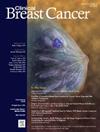Clinical and Pathological Features of Early-Stage Metaplastic Carcinoma and Associated Patient Outcomes
IF 2.5
3区 医学
Q2 ONCOLOGY
引用次数: 0
Abstract
Background
Metaplastic breast carcinoma (MpBC) is an aggressive subtype of breast cancer that is usually resistant to chemotherapy. Few studies have analyzed the role of immunotherapy and other treatments in early stage MpBC. We identified clinicopathological and sociodemographic factors associated with treatment response and recurrence of disease among patients with nonmetastatic MpBC within 2 hospital systems.
Methods
A retrospective study was performed to evaluate female patients diagnosed with Stage I to Stage III MpBC within a safety-net hospital and private cancer center from January 2013 to October 2024.
Results
We identified 54 patients with MpBC with a mean age of diagnosis of 55.2 years. There were 14 (25.95%) White, 26 (48.1%) Black, and 10 (18.5%) Hispanic patients. Thirteen (24.1%) patients were uninsured at the time of diagnosis. In total, 49 (90.7%) patients received chemotherapy and 19 (35.2%) received immunotherapy. Eight (14.8%) patients experienced MpBC recurrence at the time of this review. Patients with squamous features (P = .04) and Ki-67 ≥ 51% (P = .02) on histology were more likely to have a recurrence of disease. Patients with squamous histology (P = .02) were more likely to have greater residual cancer burden after neoadjuvant therapy. Treatment with immunotherapy, such as PD-L1 inhibitors, in addition to chemotherapy did not reduce disease recurrence.
Conclusions
MpBC remains an aggressive and treatment-resistant form of breast cancer. In our cohort of early-stage cases, the addition of immunotherapy to chemotherapy did not reduce the recurrence of disease. Additionally, treatment response and resistance may vary among the various histologic subtypes of MpBC.
早期化生癌的临床病理特征及相关患者预后。
背景:化生性乳腺癌(MpBC)是一种具有侵袭性的乳腺癌亚型,通常对化疗具有耐药性。很少有研究分析免疫治疗和其他治疗在早期MpBC中的作用。我们在两个医院系统中确定了与非转移性MpBC患者的治疗反应和疾病复发相关的临床病理和社会人口学因素。方法:回顾性研究2013年1月至2024年10月在一家安全网医院和私立癌症中心诊断为I期至III期MpBC的女性患者。结果:我们确定了54例MpBC患者,平均诊断年龄为55.2岁。白人14例(25.95%),黑人26例(48.1%),西班牙裔10例(18.5%)。13例(24.1%)患者在诊断时没有保险。49例(90.7%)患者接受化疗,19例(35.2%)患者接受免疫治疗。8例(14.8%)患者在本综述时经历了MpBC复发。组织学上有鳞状特征(P = 0.04)且Ki-67≥51% (P = 0.02)的患者更容易复发。组织学呈鳞状(P = 0.02)的患者在新辅助治疗后残留癌负担更大。除化疗外,采用免疫疗法(如PD-L1抑制剂)治疗并没有减少疾病复发。结论:MpBC仍然是一种具有侵袭性和治疗抵抗性的乳腺癌。在我们的早期病例队列中,在化疗的基础上增加免疫治疗并没有减少疾病的复发。此外,治疗反应和耐药可能因不同组织学亚型的MpBC而异。
本文章由计算机程序翻译,如有差异,请以英文原文为准。
求助全文
约1分钟内获得全文
求助全文
来源期刊

Clinical breast cancer
医学-肿瘤学
CiteScore
5.40
自引率
3.20%
发文量
174
审稿时长
48 days
期刊介绍:
Clinical Breast Cancer is a peer-reviewed bimonthly journal that publishes original articles describing various aspects of clinical and translational research of breast cancer. Clinical Breast Cancer is devoted to articles on detection, diagnosis, prevention, and treatment of breast cancer. The main emphasis is on recent scientific developments in all areas related to breast cancer. Specific areas of interest include clinical research reports from various therapeutic modalities, cancer genetics, drug sensitivity and resistance, novel imaging, tumor genomics, biomarkers, and chemoprevention strategies.
 求助内容:
求助内容: 应助结果提醒方式:
应助结果提醒方式:


